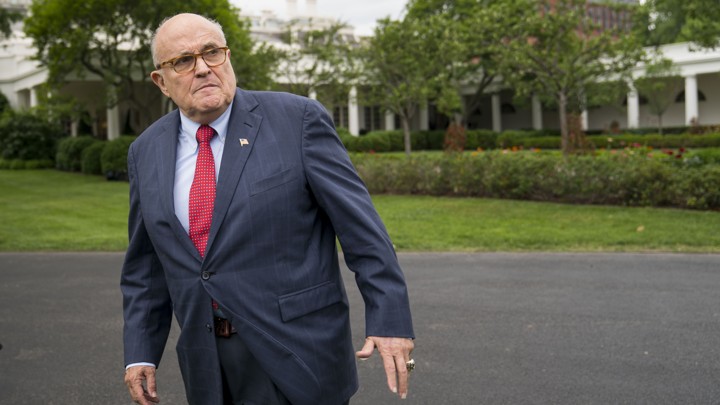
Rudy Giuliani Is Living the Dream
by Franklin Foer- Link Copied
It can sometimes seem as if Donald Trump has outsourced the defense of his presidency to an erratic buffoon. Rudy Giuliani is the self-styled security expert who can’t stop butt-dialing. He is the trusted attorney whom journalists routinely bait into damning admissions. The man once hailed as America’s mayor is now widely viewed as a walking gaffe.
In the pages of Adam Schiff’s impeachment report, however, an entirely different character emerges. That Giuliani is a savvy operator who rolls his bureaucratic opponents with ruthlessness and ease. He is the master of what Ambassador William Taylor branded the “irregular channel,” which appears to have been a very profitable piece of turf. Giuliani’s unofficial perch in the Trump administration seems to be the basis for a booming business. Butt-dials aside, he should be regarded as one of the most outrageously effective influence peddlers of all time.
To understand the practice Giuliani has built, it’s useful to compare his trajectory with that of Paul Manafort. Both men offered their services to Trump for free, which they likely understood would ingratiate themselves with the mogul, who notoriously hates paying contractors. And they seem to have shared a theory of how Trump could be monetized. After establishing their proximity to the president, they likely understood that the perception of incomparable access would have magnetic appeal to foreign clients. When Manafort landed in jail, Giuliani had no rival for the title of the ultimate fixer in Trump’s Washington.
Giuliani has specialized in the growth market of kleptocrats hoping to avoid jail. He has represented a Romanian real-estate magnate imprisoned for a shady land deal, and a Turkish gold trader accused of funneling money to Iran. Then there’s his mystery client suspected of foreign bribery, whose case he discussed with the head of the Department of Justice’s criminal division. Giuliani described this client to The New York Times as “very, very sensitive.” These clients seem to hire Giuliani not for his courtroom skills or strategic acumen, but in the hopes that his prestige and bureaucratic skill can rescue them from prosecution.
Read: “You should be happy for your country that I uncovered this”
To mock Giuliani is to overlook his success. There’s now a definitive narrative of how he orchestrated the removal of an American ambassador. Phone logs show that he had a level of access that legendary power brokers such as Clark Clifford and Robert Strauss would envy. He routinely spoke with the likes of the secretary of state and national security adviser. If you were to aggregate the Rolodexes of every lobbying shop in Washington into one mega-firm, it would never be able to blanket the administration like Giuliani has.
Giuliani supplements his inside game with a potent media strategy. In the form of The Hill’s John Solomon, Giuliani had a columnist who apparently parroted his talking points. (Solomon even forwarded Giuliani a copy of one piece hours before its publication.) Through his appearances on Fox News, he has the opportunity to demonstrate his undying loyalty to the couch potato in the West Wing. These television hits also allow him to mold the thinking of the Republican base. He can shape a political climate so that his phone calls and meetings have the highest likelihood of success.
But what makes Giuliani such a dangerous figure is that one can never be sure whom he is representing. Is he advocating on behalf of the president, or an unnamed client? This is a blurry line that he actively exploits, such as the time he solicited the business of the king of Bahrain—now a client. When he first arrived in the country, state media described him as leading a “high-level United States delegation.”
David A. Graham: Why hasn’t Trump thrown Rudy Giuliani under the bus?
His efforts in Ukraine are also a confusing mélange of private interests and presidential mission. The men he enlisted to dig up dirt on Joe Biden—Lev Parnas and Igor Fruman—paid him $500,000. Pause to consider the oddness of that transaction: The operatives he dispatched to run a political errand, who traveled the world on his behalf, were paying him for the privilege.
Or take the corrupt Ukrainian prosecutor general, Yuriy Lutsenko, who concocted conspiracy theories about his archenemy, Ambassador Marie Yovanovitch. These were theories that Giuliani disseminated widely, and that provided pretext for her ousting. According to The Wall Street Journal, Giuliani drew up an agreement whereby Lutsenko would pay him $250,000. Even though Giuliani ultimately shelved the idea of a monetary relationship with Lutsenko, the fact that he considered it is highly revealing.
Did he orchestrate the ousting of Yovanovitch because he believed that she was an obstacle to the investigations of Biden? Or did he orchestrate her ousting because it served the interests of clients paying him money? If this was a drug deal, as John Bolton termed the effort to pressure Ukraine for political help, was he the kingpin or the mule?
The Schiff inquest was tightly focused. It steered clear of Giuliani’s business dealings. Thus, the big questions about the president’s personal attorney remain unanswered—although it has been reported that prosecutors in the Southern District of New York are looking into them. The public doesn’t know Giuliani’s roster of clients, or what they want from the United States government. The public doesn’t know how much money the president’s unpaid lawyer has made by apparently exploiting his unofficial position. These are not questions relevant to an impeachment proceeding, but they are essential for the protection of the republic.
When constitutional scholars explained the case for impeachment last week, they cited the Founders’ phobia of foreign manipulation. The fear was that other countries might secretly influence a president to act contrary to the national interests, that interests from abroad would distort policy outside the public’s view. Behavior that terrified the Founders seems to be the very core of Giuliani’s business model. Donald Trump’s lawyer is Benjamin Franklin’s night sweats.